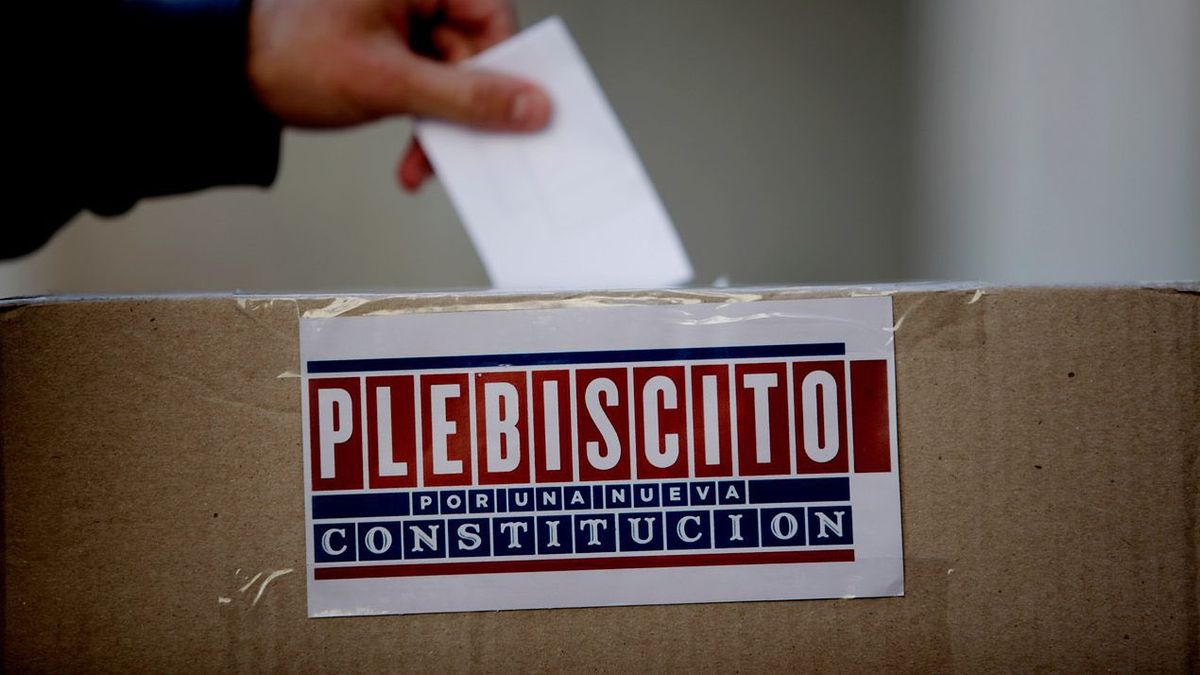It is the second time in just over a year that the South American country has held a vote to replace its current text, a promise born of large-scale, and sometimes violent, protests against inequality, which gripped the country in late 2019.
The first assembly elected to draft a new text was dominated by the left, but its draft, focused on social, indigenous, environmental and gender rightswas overwhelmingly rejected in September of last year.
Constitutional plebiscite: Chile seek reform of its Magna Carta
This text that is now put to a vote and is considered more conservative and favorable to the market than the Constitution current. The version places private property rights and strict rules around immigration and security at the center.
For months, polls have shown that this proposal is also likely to be rejected, although the gap narrowed in the run-up to the referendum.
plebiscite chile votes 2023.jpg
The latest survey by the Cadem firm, conducted on December 1 before a 15-day electoral blockade, showed that 47% planned to vote against it (-3 points from November 10) compared to 38% who plan to approve it (+ 6 points).
Nicholas Watson, CEO of consultancy Teneo, said in a report that regardless of the outcome, there is the potential for further disillusionment with the political establishment.
“That leaves the causes of the 2019 protests largely unresolved, with all the risks that this implies still latent”, he opined.
If the new text is approved, the report says it would further hamper leftist President Gabriel Boric’s agenda of tax and pension reforms.
boric.jpg

“But while a ‘no’ victory would give Boric a boost, it would not be transformative since he would still have failed in one of his main objectives: replacing the 1980 Constitution,” he highlighted.
The polls open at 8:00 a.m. local time (1100 GMT) and will close at 6:00 p.m. (2100 GMT). Results are expected around 8:00 p.m. (2300 GMT). (Reporting by Alexander Villegas and Fabián Cambero)
Constitutional plebiscite in Chile: what are the changes proposed by the reform
Abortion and gender equality
The voluntary interruption of pregnancy is one of the most conflictive points of the new proposal, which introduces a nuance with respect to the current Constitution. The text states that “the law protects the life of the unborn”, replacing the “what” of the original formulation with the word “who”. Furthermore, the text names as “child” “any human being under eighteen years of age” and enables “conscientious objection”, a mechanism that could make access to the practice difficult.
The new text includes what is often called input parity; that is, the guarantee of the presentation of an equal number of applications from women and men. However, it does not ensure output parity, which also guarantees that the resulting positions are distributed in a balanced manner.
In a video in which she spoke out loudly “against” the new text, the former president of Chile, Michelle Bachelet, states: “This proposal puts a limit on what many women have promoted for decades, true state protection and a debate on critical issues such as equal pay, reproductive rights or equal participation. We must go further, expanding those rights, not limiting them.
Migration
The proposed Constitution enables the expulsion of illegal immigrants, when it states that: “The law will establish the cases, procedures, forms and conditions of the egress or expulsion in the shortest possible time, as appropriate, of those foreigners who have entered the national territory clandestinely or through unauthorized steps, as well as those who have served an effective prison sentence in Chile for crimes or simple crimes.”
living place
Regarding access to housing, the new text affirms the promotion of “actions aimed at the progressive satisfaction of this right, with reference to access to one’s own home”, although it introduces a novelty: for the first time, the payment of taxes is eliminated and housing contributions. “The property intended for the owner’s main home, whether he lives there alone or with his family, where applicable, will be exempt from all contributions and land taxes.”
Francisco Vidal, former Minister of National Defense (2009-2010), assured that only 23% of Chileans with the highest income are currently covered by this tax. “Chile is a very territorially segregated country, so the communes are financed jointly. Removing the housing tax means definancing the rest of the communes,” he explained to CNN.
Original towns
The proposed text for the new Constitution recognizes indigenous peoples, and states that it will “respect and promote their individual and collective rights.” It also enshrines “interculturality as a value of the country’s ethnic and cultural diversity.”
However, it clarifies that it recognizes them “as part of the Chilean Nation, which is one and indivisible,” in reference to the Mapuche conflict in the south of the country and the national demands of that community. Furthermore, throughout the text there are a series of mentions of terrorism, which it declares “in any of its forms (…) contrary to human rights and the security of the Nation”, in addition to recognizing “especially the victims of terrorism”.
Health, education and pensions
In terms of health, education and pensions, the new text does not introduce major changes with respect to the current Constitution and maintains a mixed scheme. Its critics claim that in this way a system of strong social fragmentation is “institutionalized.”
In the case of the health system, it is divided into a public system – which covers 83% of the population – with major deficiencies and waiting lists of up to two million people; and the private system, of high level but in which only 17% of the population is served.
In the case of Education, the pattern is repeated, with only 9% of the population accessing the private system, and 91% relegated to a public system with many problems. In relation to pensions and retirements, the current system is reinforced and the possibility of a pay-as-you-go system is ruled out.
Source: Ambito




